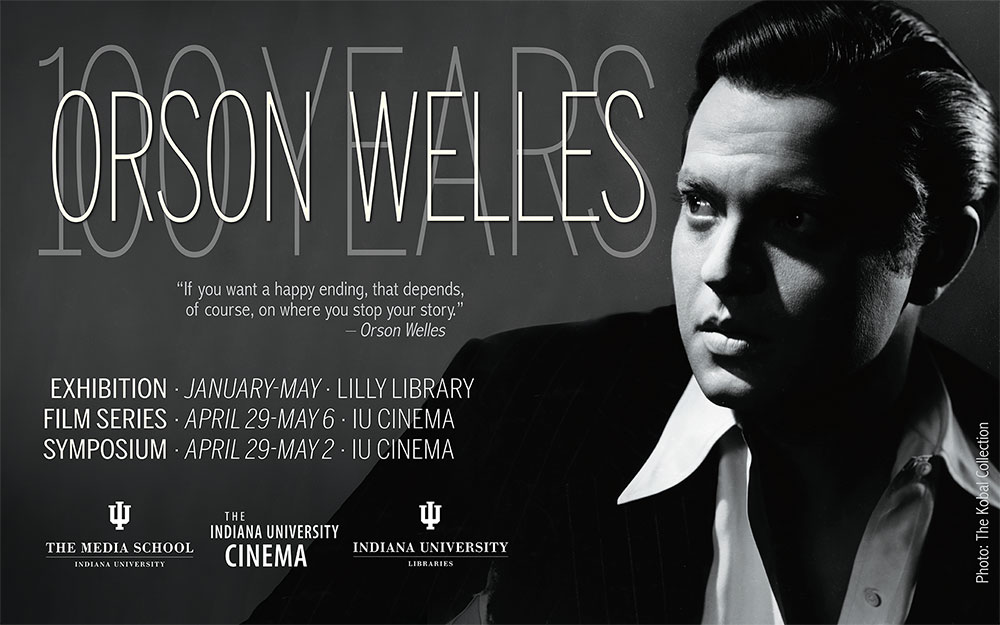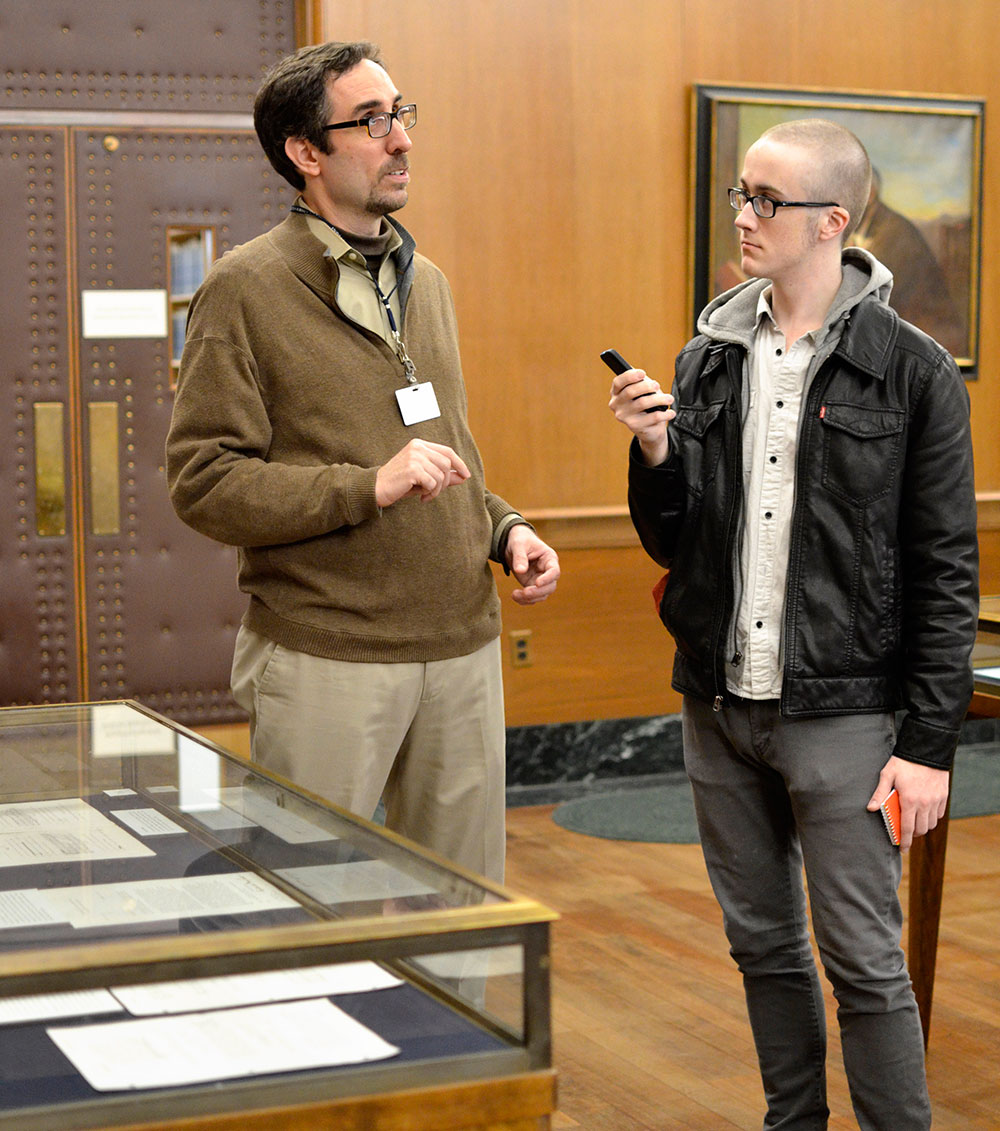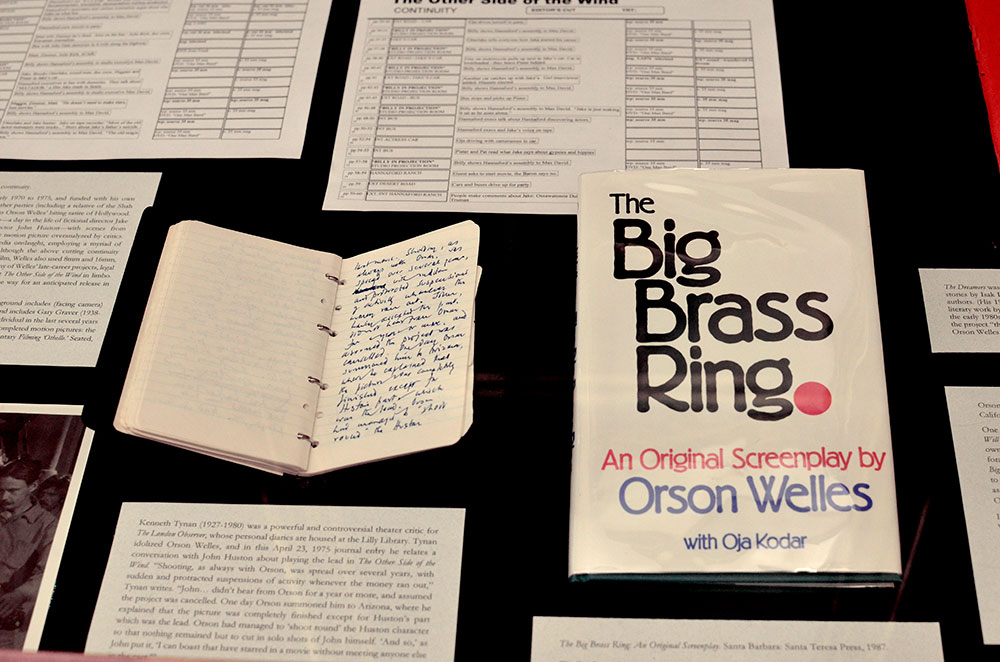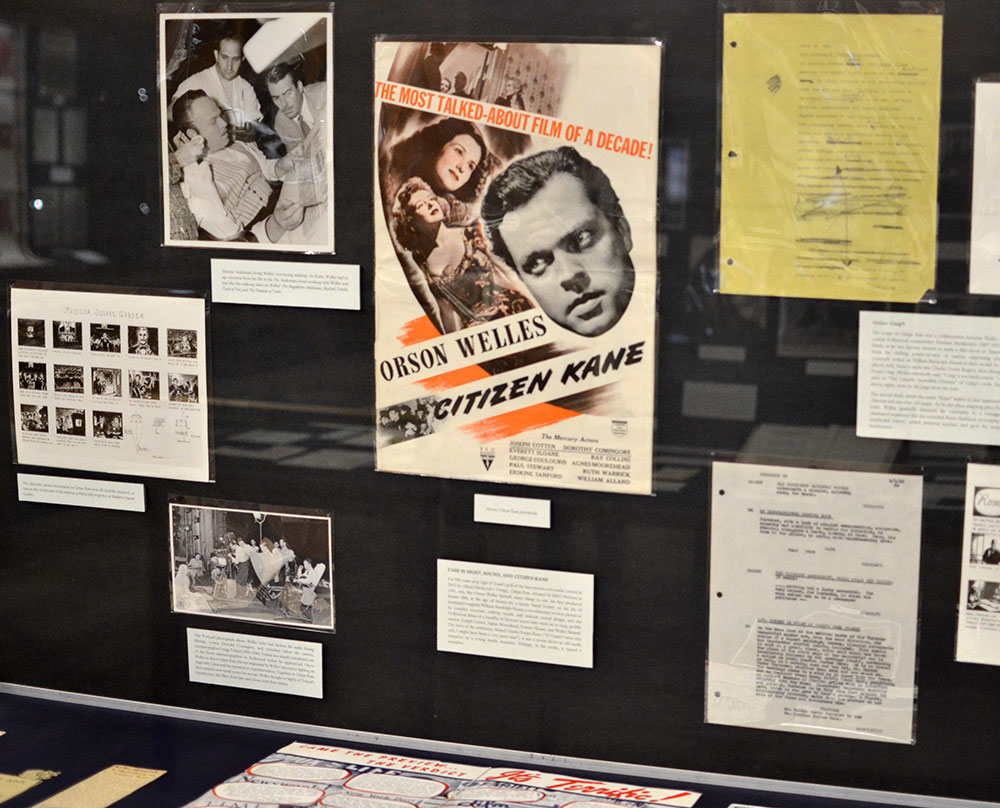Welles symposium features exhibit, lectures, screenings

IU will celebrate filmmaker Orson Welles’ 100th birthday with a five-day film symposium in May and a semester-long exhibit at the Lilly Library.
The symposium will feature screenings of Welles’ popular and lesser-known cinematic works, research talks and lectures by Welles scholars from IU and around the country, and other events open to the public. The April 29 to May 3 event, Orson Welles: A Centennial Celebration and Symposium, is sponsored by the IU Cinema, IU Media School and IU Libraries.
100 Years of Orson Welles: Master of Stage, Sound and Screen
Shows a poster of Orson Welles celebrating 100 years.
The exhibit is 100 years of Orson Welles: Master of Stage, Sound and Screen, and it contains over 150 items from a dozen collections housed here at the Lilly Library. A few of the items that are on display include an original screenplay for “Citizen Kane.” In fact, the very first page, which I love because for one thing there are annotations on the page.
The video spans the first page of the transcript with the pen annotations.
I love to see how a creative work goes to a lot of different changes.
Craig Simpson, Lilly Library Manuscript Archivist
Most of the items come from the Orson Welles manuscripts, which the Lilly purchased in 1978 from Richard Wilson who was a longtime business partner of Orson Welles.
The video shows the inside of the Lilly Library.
A lot of the key creative works that Welles produced during that time are in the collection. For example, the “Voodoo Macbeth,” “Julius Caesar,” both of those on stage, “War of the Worlds” on the radio and of course “Citizen Kane” on the screen. Orson Welles was a pioneer in three different media: theater, radio and film.
Shows photos of Orson Welles.
I’d be hard-pressed to think of anyone else who was a signature artist in those three types of media, and because of that, Welles really, I think, helped define the today 20th century and the arts of the 20th century. He was really a genius at making us see art in a new way, and a lot of the techniques that people use now in, in the media and in cinema were started one way or another by Orson Welles.
Video shows Craig Simpson talking to someone inside the Lilly Library, in front of an Orson Welles display.
Orson Welles does not begin and end with “Citizen Kane.” “Citizen Kane” is a great, important work in his life and career, but Orson Welles also did a lot of great work before “Citizen Kane,” and he did a lot of great, important work after “Citizen Kane.”
Shows old photos of Orson Welles and his work.
And what I tried to do with this exhibition was to show the broad overview of his career, to have a combination of the greatest hits, of the things that people may know and, and also some really hidden gems of things that people may not know anything about, and hopefully all of these things can add up to, to a clearer picture of who he was.
Produced by Bronson DeLeon
Orson Welles was a director, actor, writer and producer known for his work in radio, film and theater. He and John Houseman founded the Mercury Theater in 1937, and he became famous for his radio broadcast of War of the Worlds in 1938, which reportedly was misinterpreted by some listeners as an actual Martian invasion.
In 1941, he co-wrote, produced, directed and starred in Citizen Kane, which consistently appears on “best movies” lists and in film anthologies. His other notable films include Touch of Evil and The Magnificent Ambersons.
Staging a symposium at IU on the 100th anniversary of Welles’ birth makes sense, organizers say, as the Lilly Library is home to 20,000 items related to Welles’ career or once belonging to the filmmaker. And scholars such as Professor Emeritus James Naremore have focused on Welles in their research, receiving acclaim in academic and film circles for their analyses and work.
IU Cinema director Jon Vickers said the idea grew from a discussion he had with Craig Simpson, archivist at the Lilly Library.
“It started off as a conversation of ‘Let’s do this Welles-apalooza,’” Vickers said.
The IU Cinema’s state-of-the-art venue will provide a home base for the screenings, talks and other events, Vickers said.

While planning continues, one element of the symposium already is open to the curious. The Lilly Library exhibit, “100 Years of Orson Welles: Master of Stage, Sound and Screen,” opened Jan. 20 and features 150 pieces of Orson Welles memorabilia. These items were drawn from a dozen different collections housed at the Lilly Library, including a 1978 purchase from one of Welles’ business partners and the Orson Welles manuscripts and the papers of director Peter Bogdanovich, whose extensive interviews formed the book This Is Orson Welles.
“Orson Welles does not begin and end with Citizen Kane,” said archivist Simpson, who curated the exhibit. “It was a great, important work in his life and career, but Orson Welles did a lot of great work before Citizen Kane, and he did a lot of great work after Citizen Kane.”
Simpson selected materials related to Citizen Kane to feature in the exhibit, but he also chose pieces from Welles’ time in theater. Materials from his Voodoo Macbeth, which was the first interpretation of Shakespeare to feature an entirely African-American cast, are among the works featured in the Lilly Library. Fragments of his incomplete movies also are on display.
“What I tried to do with this exhibition is to show the broad overview of his career, to have a combination of the ‘greatest hits’ of the things people may know and also some really hidden gems that people may not know anything about,” Simpson said. “Hopefully, these things can add up to a clearer picture of who he really was.”
Orson Welles never achieved significant economic success, Simpson said. Many of his movies were shot piecemeal over several years. Othello was the first movie he made as an independent filmmaker. When the money ran out, he would raise more funds to shoot more footage.

“So there’s some scenes when the camera is facing one actor, and they could be in Italy shooting that, and they would cut to the other person talking to him, and it’s three years later in Morocco.” Simpson said. “But he was a genius at putting all of this stuff together.”
Until recently, many scholars considered Orson Welles’ career after Citizen Kane to be a failure. Craig Simpson doesn’t agree. He said Welles was involved in a wide variety of artistic projects that pushed the envelope of media.
“It was a fun challenge to try and establish some type of clarity that an exhibit requires, and hopefully it will inspire people to dig further, to see his films, and read up on him from a lot of great scholars who have taught me pretty much everything I know about Orson Welles.”
James Naremore, a Chancellors’ Professor of Communication and Culture, English and Comparative Literature and the author of The Magic of Orson Welles, is one of IU’s resident Orson Welles scholars. He is scheduled to give the keynote address April 30.
Naremore said he was first introduced to Welles in his youth.
“I was living in a small town in Louisiana, and over across the border in Texas a movie was showing Citizen Kane. I hitchhiked over there to see the movie,” Naremore said.
That introduction to Orson Welles sparked his interest, which persisted to into his years in academia, and it was one of the reasons why he chose to study film instead of English literature.

“People tend to assume that Welles was this fellow who did the Mars broadcast and who made Citizen Kane, and they don’t know very much about anything after that,” Naremore said.
What Naremore explored in his studies was the way Welles experimented with media that was new at the time.
“I think today, with digital media and what that allows with individuals not needing a big bank roll, I think he would be very interested in that,” Naremore said.
Simpson said he thinks the upcoming symposium will introduce a new generation to Orson Welles as a creative mind.
“His work is very much a living thing, it’s not static,” he said. “And this exhibit only scratches the surface.”
The symposium, though, will go deep into Welles’ work. Already on the schedule are panel discussions on various topics with scholars from around the world, screenings of Welles’ films and work about Welles, and other special events yet to be announced.

